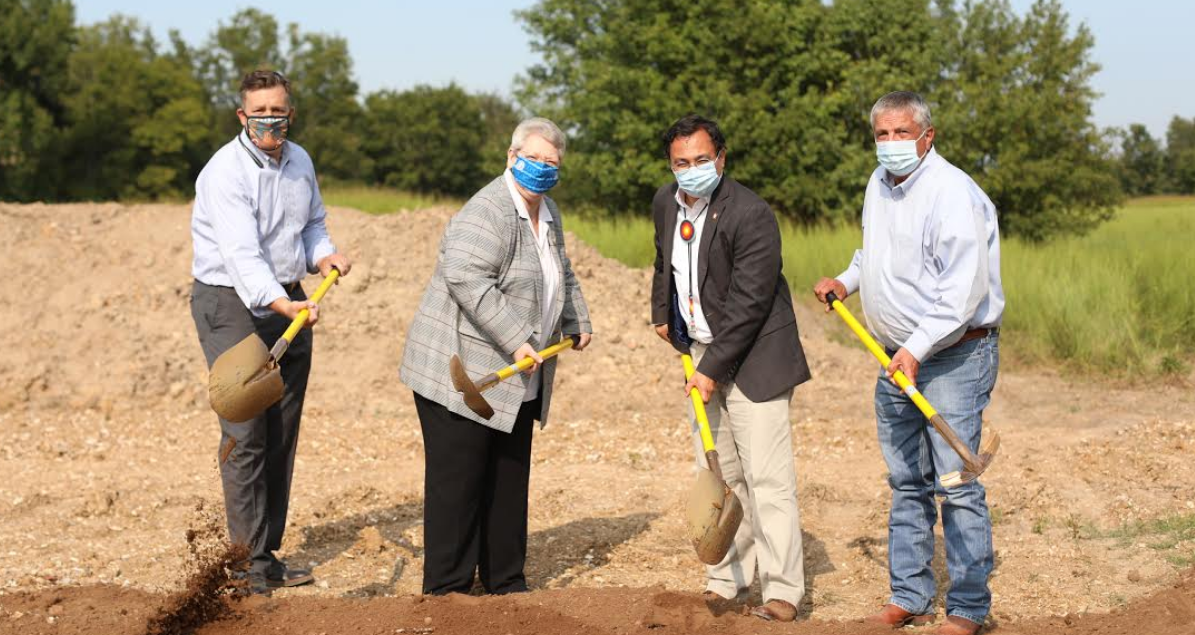
- Details
- By Chez Oxendine
TAHLEQUAH, Okla. — Covid-19 prompted an unprecedented federal stimulus effort through the CARES Act. That legislation included $8 billion in set-aside funds for federally recognized tribes across the country.
As the pandemic continues, Oklahoma tribes continue finding new ways to put that money to use in supporting ailing communities and members in need. Many tribes have allocated the funds directly to their most needy members through added unemployment benefits or back to school funds.
Others have repurposed or constructed new facilities to deal with a range of new needs for their community – such as Cherokee Nation’s newest suite of projects, titled “Respond, Recover and Rebuild.”
The Cherokee Nation will be building eight new facilities and remodeling four others in response to Covid-19, the tribe announced in early September.
“Cherokee Nation leaders broke ground [Sept. 8] on $25 million worth of Respond, Recover and Rebuild projects that range from PPE manufacturing and space for social distancing, to food outreach sites and a new employee health care facility,” reads a press release.
The projects are located throughout the Cherokee Nation including Tahlequah, Belfonte, Stilwell, Kansas, Jay, Vinita, Catoosa, Pryor, Muskogee and Hulbert.
“We went where the needs are and the need is all over, and different for different communities,” Principal Chief Chuck Hoskin Jr. said. “There is an ongoing need for PPE manufacturing, so we are having Cherokees produce them in the Cherokee Nation. Other facilities are going to be used for food security efforts. As we continue the largest emergency food distribution program in the history of the Cherokee Nation, we need strategic locations to store and distribute food.
Other locations are a way to spread staff and the citizens they serve out through social distancing.”
The new manufacturing site in Stilwell will hire around 20 employees and double as a drive-through public health outreach facility.
“We are finding ways to put Cherokees to work here by manufacturing equipment that will make a difference in our community and across the country,” said District 7 Tribal Councilor Canaan Duncan. “COVID has certainly taken a toll on all of us, but by having a site to manufacture PPE
and test for COVID in our community, we will make a huge difference.”
Stilwell resident Jimmy Jacobs was excited to hear the news, he said.
“That’s a business that won’t go away anytime soon – it’s a smart investment, I think,” Jacobs said. “People are going to need that stuff. We need it now, even. We need the jobs and the equipment. Everybody wins.”
Other facilities in Vinita, Kan., Belafonte and Jay will be used for food outreach, according to the press release.
“Our main goal here is to build a food distribution site where we can supply this area, and take a strategic look at the 14 counties,” Deputy Principal Chief Bryan Warner said. “This is one of the areas where they can reach out to the individuals a lot faster than we can as a whole, but they are still part of our umbrella and part of our family and it’s a big part of ga-du-gi, to come together and work together.”
Jacobs said he was glad to see the money spent in a way that tangibly helps the tribe.
“There’s a lot of bureaucracy, of course, but it’s nice to see them doing something so visible, I guess is the word,” he said. “It really makes you feel like they’ve got your back.”
More Stories Like This
Native News Weekly (August 25, 2024): D.C. BriefsDeb Haaland Earns Endorsement From Communications Workers of America Local 7076
University Soccer Standout Leads by Example
Two Native Americans Named to Democratic Congressional Campaign Committee's“Red to Blue” Program
Cheyenne River Youth Project Hosts Young Women’s Winter Camp as Part of Lakota Culture Internship
Help us defend tribal sovereignty.
At Native News Online, our mission is rooted in telling the stories that strengthen sovereignty and uplift Indigenous voices — not just at year’s end, but every single day.
Because of your generosity last year, we were able to keep our reporters on the ground in tribal communities, at national gatherings and in the halls of Congress — covering the issues that matter most to Indian Country: sovereignty, culture, education, health and economic opportunity.
That support sustained us through a tough year in 2025. Now, as we look to the year ahead, we need your help right now to ensure warrior journalism remains strong — reporting that defends tribal sovereignty, amplifies Native truth, and holds power accountable.
 The stakes couldn't be higher. Your support keeps Native voices heard, Native stories told and Native sovereignty defended.
The stakes couldn't be higher. Your support keeps Native voices heard, Native stories told and Native sovereignty defended.
Stand with Warrior Journalism today.
Levi Rickert (Potawatomi), Editor & Publisher

